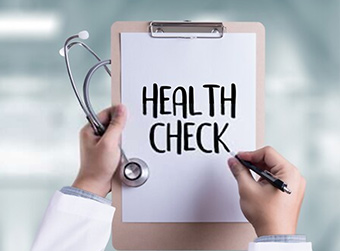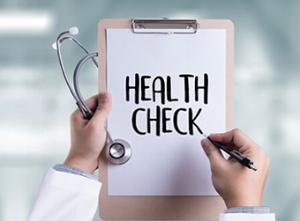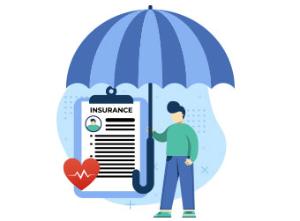11 annual health screening tests you should do in your 30s.
Blog Title
1939 |
“Treatment without prevention is simply unsustainable.” Bill Gates.
Out of the total 24 hours a day, you spend around 10-12 hours earning money. The irony is you have no time for keeping our health in order. Your different priorities take over throughout the day and you end the day without doing anything about your health.
You have completely ignored the wisdom “Prevention is better than cure” so much so that you even don’t care to do preventive medical tests. You religiously do preventive maintenance of your car but not of your body.
Blood pressure is a common disorder known as the silent killer as it goes unnoticed for long. In the US and in India around 1 person in 3 is suffering from high blood pressure. Imagine how many people must be dying for not diagnosing this very common disease.
“High blood pressure or hypertension kills nearly 1.5 million people every year
in South-East Asia,” Dr. Ramakanta Panda, AHI.
Likewise, there are many diseases which can be prevented by taking timely action if you are equally alert about your health as you are about your car’s health.
Following are the some of the preventive tests you should do every year even if you think you are healthy.
- Blood Pressure:
If the high number (systolic number) is between 120 and 139 or the bottom number (diastolic number) is between 80 and 89 mm Hg, then continue to have it checked every year.
If the top number is greater than 140 or the bottom number is greater than 90, schedule an appointment with your doctor.
The ideal blood pressure should be 80 (diastolic) and 120 (systolic).
- Cholesterol:
This is a blood test known as a lipid profile test. This test measures total cholesterol, triglycerides, high-density lipoprotein (HDL) and low-density lipoprotein (LDL) levels.
The LDL and triglycerides should ideally be < 130 and HDL > 60.
HDL is known as good cholesterol and LDL as bad cholesterol. Higher HDL is good and LDL should be lower.
Unchecked high cholesterol can be a cause of heart attack. Check your cholesterol level annually and take action to manage it within the desired range. In the case of high cholesterol consult your doctor.
- Diabetes:
This is a blood and urine tests which measure sugar level in the blood. Blood is taken in the morning after an overnight fast. Fasting blood sugar level less than 100 mg/dL (5.6 mmol/L) is normal.
A fasting blood sugar level from 100 to 125 mg/dL (5.6 to 6.9 mmol/L) is considered pre-diabetes. If it’s 126 mg/dL (7 mmol/L) or higher on two separate tests, you have diabetes.
The 2nd test is a Post Prandial Glucose test conducted 2 hours after the morning meal. According to Metropolis; this is a blood glucose test that decides the measure of a particular type of sugar, named as glucose. In this test, Glucose is measured in the blood, particularly after a meal.
India is the capital of Diabetes. Annual blood sugar tests will help you to take timely action.
- Cancer:
According to the National Cancer Institute following tests helps in early detection of cancer;
Mammography: This method to screen for breast cancer has been shown to reduce mortality from the disease among women ages 40 to 74, especially those ages 50 or older.
Pap test and human papillomavirus (HPV) testing: These tests reduce the incidence of cervical cancer because they allow abnormal cells to be identified and treated before they become cancer.
Clinical breast exams and regular breast self-exams: The Routine examination of the breasts by health care providers or by women themselves have not been shown to reduce deaths from breast cancer
PSA test: This blood test, which is often done along with a digital rectal exam, is able to detect prostate cancer at an early stage.
The incidence of Cancer is on the rise. These preventive tests are always recommended annually.
- Dental:
Visit your dentist and get your oral hygiene tests done. Early detection of tooth decay can help in limiting the damage and early treatment.
- Eyes:
Centers for disease control and prevention recommends following eye test frequency for different ages;
Children’s eyes should be checked regularly by an eye doctor or pediatrician. The US Preventive Services Task Force recommends vision screening for all children at least once between age 3 and 5 years to detect amblyopia or risk factors for the disease.
People with diabetes should have a dilated eye exam every year.
Some people are at higher risk for glaucoma and should have a dilated eye exam every 2 years:
People with a family history of glaucoma should get the eye checkups annually.
- Osteoporosis:
The bone mineral density (BMD) test is the primary test used to identify osteoporosis and low bone mass. One of the preferred and most accurate ways to measure BMD is Dexa-Scan (dual-energy X-ray absorptiometry or DXA).
- ECG:
An electrocardiogram can be a useful way to find out whether our high blood pressure has caused any damage to our heart or blood vessels.
Some of the things an ECG reading can detect are:
- Cholesterol clogs up our heart’s blood supply
- A heart attack in the past
- Enlargement of one side of the heart
- Abnormal heart rhythms
Liver Function Test (LFT):
Liver function tests are blood tests that check to see how well our liver is working. They check for liver damage and can help diagnose liver diseases such as hepatitis and cirrhosis. (1)
Kidney Function Test (KFT):
Our kidney health is determined by 2 tests: ACR (Albumin to Creatinine Ratio) and GFR (glomerular filtration rate ). GFR is a measure of kidney function and is performed through a blood test.
- Vitamins:
Vitamin B12 and Vitamin D are amongst the most important vitamins the human body needs. Vitamin B12 is needed to make the genetic material our body needs, it also helps in decreasing heart disease and is required to produce red blood cells.
Vitamin D helps in strengthening the bones as it helps in maintaining phosphorus and calcium levels in our blood. Early detection is necessary to prevent these diseases.
A simple blood test measures the level of these vitamins.
These are some of the basic health tests to detect some of the health issues you might encounter.
You are living a stressful life. You are eating unhealthy processed food. Your food time is uncertain. This kind of lifestyle requires you to be extra cautious about your health. These health checkups help you to take a grip on your health in time if your health is deteriorating.
Many people these avoid preventive tests, fearing some detection. They fear they will have to alter their lifestyle. But they forget that the status quo could prove to be more painful and deadly. Preventive health tests give you time to take timely action to regain your fitness.












